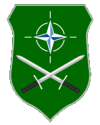
SACEUR briefs German cabinet on security environment
NATO Supreme Headquarters Allied Powers Europe (SHAPE)
Aug 27 2025
At the request of Germany's Federal Chancellor, Friedrich Merz, the Supreme Allied Commander Europe (SACEUR), U.S. Air Force Gen. Alexus G. Grynkewich, briefed the German cabinet today in Berlin on the security environment.
"It was a privilege and an honour to speak with the cabinet today," said Grynkewich. "The world is not getting any less dangerous and it is good to have a friend and Ally like Germany, who continues to lead when it comes to Euro-Atlantic security and our collective defence."
The unique occurrence comes as the German cabinet approved the creation of a national security council, who will collaborate with organisations like NATO to align German security strategies with broader defence policies.
It also comes as Germany makes major investments in its defence sector and in transatlantic defence cooperation. At The Hague Summit, Germany announced it wants to reach the 3.5 percent for core defence spending in 2029, which would more than double its defence spending from 70 billion a couple years ago to 150 billion then.
And that means Germany will have more than doubled its defence spending within a few years. From about 70 billion a couple of years ago to 150 billion euros in 2029.
While the content of Grynkewich's briefing was classified, his comments were framed around the two threats agreed to by nations in NATO's Strategic Concept, Russia and terrorism.
The concept describes the former as "the most significant and direct threat to Allies' security and to peace and stability in the Euro-Atlantic area," and the latter, in all its forms and manifestations, as "the most direct asymmetric threat to the security of our citizens and to international peace and prosperity."
Briefing all the ministers, including those from finance, research, technology and space, and the interior, is important as nations invest more in core defence, the protection of critical infrastructure, and in enhancements to resilience following an agreement at the Hague Summit. Also because military and political leaders continue to emphasize collective defence requires a whole of society approach.
"If our societies are not prepared in case war breaks out ... then you cannot really defend yourselves," said NATO Secretary General Mark Rutte in June.
Grynkewich has previously stated NATO's two threats cannot be viewed as discrete challenges.
"We see greater alignment between nations who seek to degrade the current European security framework," said Grynkewich.
After the cabinet meeting Grynkewich, along with German leaders and Rutte, visited a new Rheinmetall artillery plant in Unterluess, Germany.
Story by SHAPE Public Affairs Office
|
NEWSLETTER
|
| Join the GlobalSecurity.org mailing list |
|
|
|

